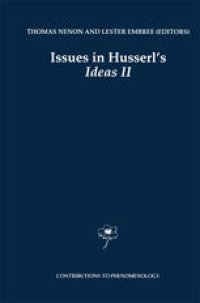
Ebook: Issues in Husserl’s Ideas II
- Tags: Phenomenology, Modern Philosophy, Philosophy of Mind, Philosophy of Nature
- Series: Contributions to Phenomenology 24
- Year: 1996
- Publisher: Springer Netherlands
- Edition: 1
- Language: English
- pdf
This volume is chiefly composed of revised versions of essays presented and discussed at the research symposium of the same title held in Delray Beach, Florida, on May 7-9, 1993. The symposium was conducted under the sponsorship of the William F. Dietrich Eminent Scholar Chair in Philosophy at Florida Atlantic University and the Center for Advanced Research in Phenomenology, Inc. Several essays have been added, including the Husserl ineditum and its translation. The intention of the project was to attract even wider appreciation for this posthumous work by Husserl, especially since it has now been first translated into English by Andre Schuwer and Richard Rojcewicz. In manuscript form, the Ideas II was known to Martin Heidegger and Maurice Merleau-Ponty before Sein und Zeit (1927) and Phenomenologie de la perception (1945), as well to Edith Stein and Ludwig Landgrebe, of course, who worked on it as Husserl' s assistants. It was published in 1952 as Volume IV of the Husserliana series, and critical studies of that volume were written by Paul Ricoeur and Alfred Schutz. Now that there is an English translation, it is increasingly being taught in the United States along with the Ideas I.
There is an almost inverse proportion between the influence that Husserl's Ideas II exercised on important philosophical developments in this century and the attention it has received in secondary literature. Ideas II is divided into three sections dealing with the constitution of material nature, the constitution of animal nature, and that of spiritual nature. The essays in this volume deal with various aspects of all three of these sections. The starting point of an essay is often a passage from the Husserlian text, yet each essay goes beyond the text, addressing the issues raised by Husserl's analyses.